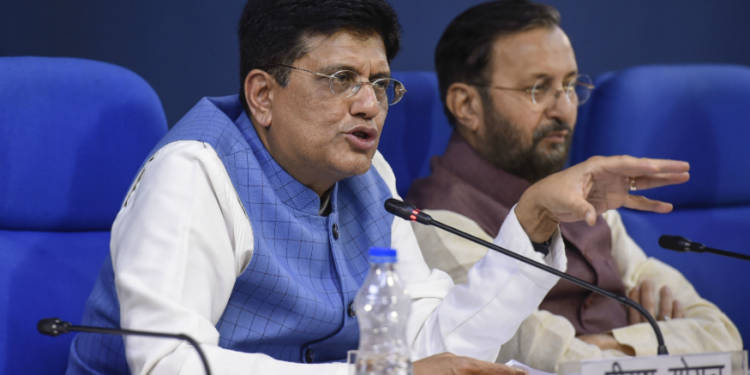One of the biggest problems faced by central, state governments in the country is the obstruction from NGOs in development projects. Indian politicians and public officials are yet to find a solution to the menace that the self righteous create NGOs create from time to time with their activism. The activism by NGOs is as old as independent India itself. The foreign funded Non-Governmental Organizations, protested against the building of Sardar Sarovar Dam. In the 80s, India tried to enhance irrigation facilities by constructions of dam, but, the self-righteous NGOs protested against this for whatever reasons.
If India wants to grow at double digit, it is important to find a solution to the NGO problem. Union Minister of Commerce and Industry, Piyush Goyal has suggested a very effective solution. Speaking at the Vibrant Goa Summit, Goyal said, “I think it’s high time that there’s a mass movement of the people of India and the people of Goa who oppose these forces, who are not allowing development to happen in Goa who are not allowing good roads, who are not allowing good hotels, who are not allowing good airports, who are not allowing the expansion of the port.”
Commenting on the anti-development activities by NGOs, Goyal said, “It is the worst form of obstructing justice for the poor of India, for providing a better quality of life for the poor people.”
The development and industrial activities in India are delayed due to activism from NGOs. The latest example of anti-development activism by NGOs is the proposed metro shed in Aarey area in North Mumbai. NGOs and other activists have been vehemently opposing the construction of the shed. The Supreme Court has restrained the authorities from cutting trees in Aarey area, the further hearing of the case special bench comprising Justices Arun Mishra and Ashok Bhushan is today.
The Aarey Colony currently occupies 1300 hectares and the government has marked 25 hectares of Aarey land which will be used for the metro car depot, which amounts to out 2% of the entire area of the Aarey Colony. But the environmental activists, part time activists from Bollywood, and many Christian groups are protesting against the construction of Metro car depot.
People who live/work in the blue circle are saying that construction of Metro shed in red circle is bad for the environment and wildlife. pic.twitter.com/JgC5h1mZwc
— Spaminder Bharti (@attomeybharti) September 19, 2019
Ironically, Film City continues to thrive inside Aarey and unsurprisingly, there were no protests when Film City was proposed in Aarey, and there is no boycott of the complex that caused the felling of 10 times more trees than the metro car shed built for public welfare.
Not only that NGOs have also been allegedly involved in conversion activities. About 14 NGOs in Kerala and Tamil Nadu and a few others in Goa, Manipur, West Bengal, Punjab and Andhra Pradesh are under the scanner for being involved in conversion activities and the Ministry of Home Affairs has taken cognisance of some of the NGOs blatant anti-national activities as there have been instances where money was used for religious activities to stir up differences.
The POSCO agitation in Odisha and the protests against the Kudankulam nuclear plant continue to stand as prime examples of NGOs trying to destabilise the country. The case of Sterlite Copper plant further reveals the extent of how some NGOs are present in the country with the sole agenda of stonewalling development.
The Sardar Sarovar Dam was one of the most critical projects which faced stinging criticism from the likes of Medha Patkar and the ilk. Needless to say, it was more of a politically motivated protest aimed at the then-Gujarat CM Narendra Modi who in turn went on a 51-hour fast to ensure that the project isn’t stalled.
P Ramnath, CEO of Sterlite Copper said, “NGOs are being used as a vehicle to destabilise the industry. They have links with Foil Vedanta in the UK, which is funded by various foundations, and they want to do the same here. They claim to be environmentalists, but they neither listen to us nor offer solutions. Their only objective is to shut down the plant.”
Sadly, the Supreme Court has put a hold on the plant and the company is facing losses in the tune of thousands of crores as the company has already invested Rs 2,500 crores. Such cases will certainly hamper the amount of Foreign Portfolio Investments in the country.
India has one of the largest NGO sector in the world. The country has more than 33 lakh registered NGOs compared to 11 lakh registered corporates. However, the funding to these organisations is not very transparent and branches of some foreign NGOs divert the funding to other pet causes, which are often detrimental to the national interest and development agenda. Only a few genuine organizations which are working for the welfare of the community face a shortage of funds.
Intelligence Bureau has reported that many foreign funded NGOs are “serving as tools for foreign policy interests of western governments.” The foreign funded NGOs have repeatedly created hurdles in major development projects and this cost 2-3 percent in India’s GDP growth, as per the report by IB.
There is no doubt that environment should be of the umpteen importance of any government given the increase in global warming, but it is critical to differentiate between genuine concerns and frivolous concerns which are aimed at halting India’s rapid pace of development. From India’s sovereignty to thousands of crores, a lot is at stake with the multitude of development projects and care must be taken to not allow anti-national NGOs to ply their trade in the country and halt India’s development. And, as Piyush Goyal said, A people’s movement against these NGOs is the need of the hour.




























